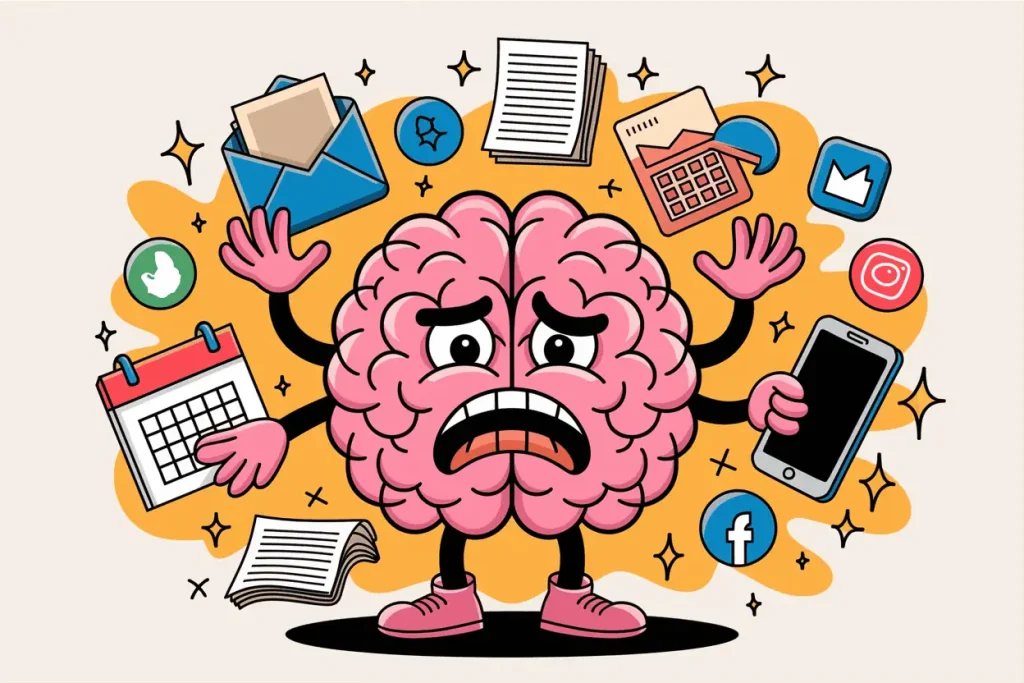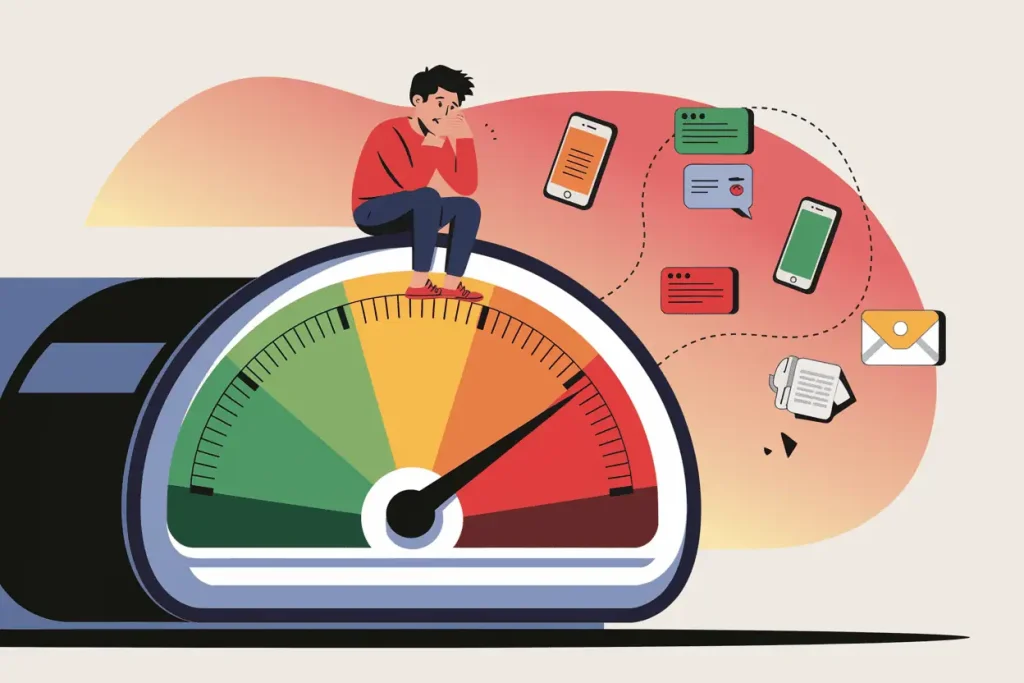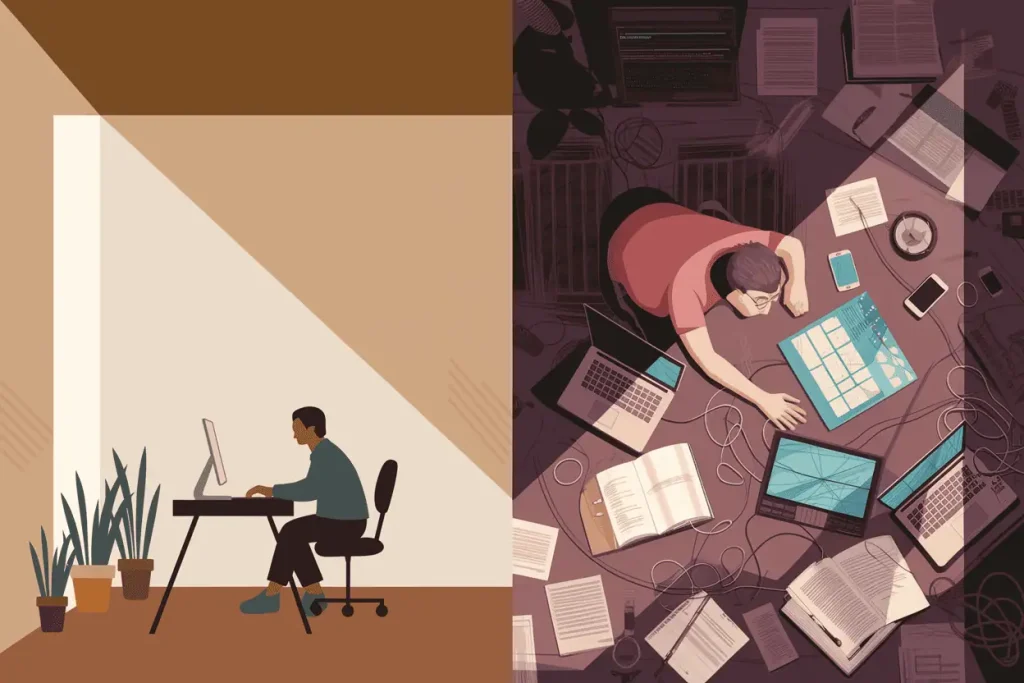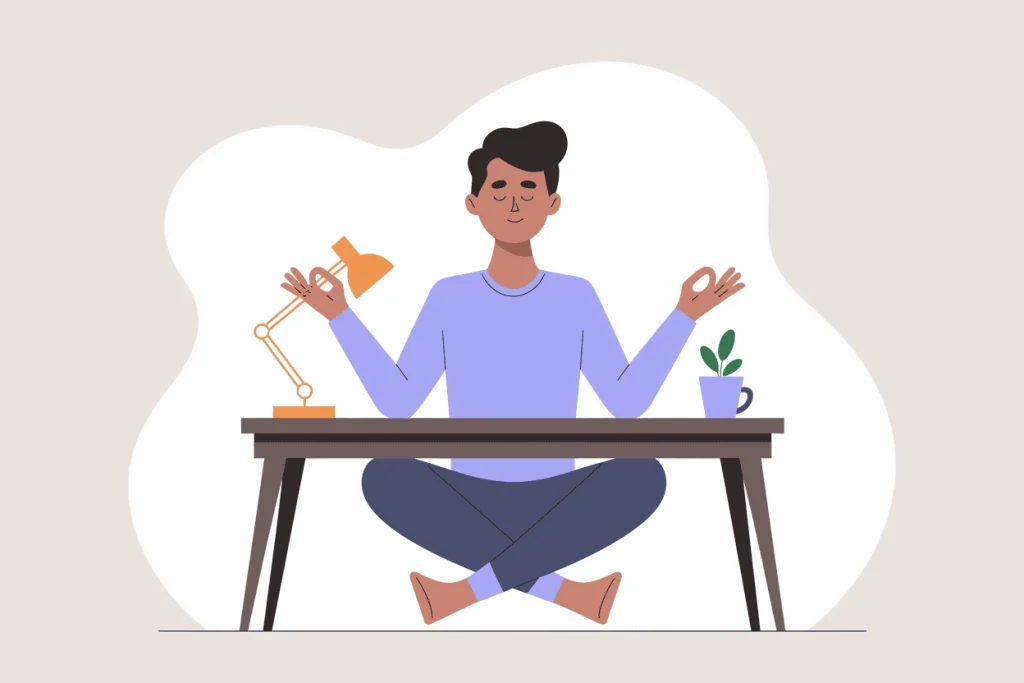How Multitasking Affects Productivity, Brain Health, and Attention Span
We all try to do many things at once; answer answer emails during meetings, check social media while watching TV, and jump between work projects. Many people think doing several things at once makes them more productive.
But research shows the opposite.
Multitasking is trying to do more than one task at the same time. Many jobs and people value this skill. But, it’s not always a healthy skill to have, as it can cost our work quality, brain health, and focus.
Knowing this, let’s explore the cost of multitasking and find better ways to work.
Table of Contents
Understanding Multitasking
Defining Multitasking
Multitasking happens in two ways.
The first one is like listening to a podcast while writing a report.
The second is switching between tasks, like bouncing between emails and a presentation.
Is this productive? In theory, yes. Does it really get so much done? Not so much…
The truth is, our brains can’t truly focus on complex tasks at the same time.
Why Multitasking Feels Good
We keep multitasking despite proof it doesn’t work well. Why? It makes us feel busy and useful, even when we get less done. Many workplaces reward people who seem to handle many tasks at once.

Each time we finish a small task, like sending an email, our brain releases dopamine. This makes us feel good. We chase this feeling, even though our work suffers.
The Brain Science of Multitasking
How Our Brains Handle Tasks
Our brains have limits. Working memory can only hold about three to five items at once. When we try to juggle too many tasks, we hit this limit fast.

The front part of our brain controls planning, decisions, and focus. This area gets strained during multitasking. And when it’s overloaded, all tasks suffer.
Switching Between Tasks
Brain research shows that humans can’t focus on two complex things at once. What we call multitasking is really task-switching.
Each time we switch tasks, our brain needs time to adjust. This takes between 0.3-2 seconds per switch. These small delays add up throughout the day and drain mental energy.
How Multitasking Hurts Productivity
More Mistakes
Studies show multitaskers make more errors. Research from Stanford found that people who often multitask do worse on thinking tasks. They get distracted more easily.
When we split our focus, we miss details. This leads to mistakes and often means we must redo work later.
Tasks Take Longer
Multitasking makes tasks take up to 40% longer. Research from the American Psychological Association proves this.
When we switch from one task to another, part of our mind stays stuck on the first task. This makes us less effective at the new task.
More complex tasks make this problem worse. I’m guilty of this, as I tried to pack tons of tasks in my day to do all at once. Sadly, it always ended in not much getting done.
Poor Priorities
Jumping between tasks makes it hard to tell what’s important. We tend to do quick, easy tasks instead of important ones that need more focus. This feels busy but often means we ignore our most vital work.
How Multitasking Affects Brain Health
More Stress
Trying to do too many things at once puts our brains on high alert. This causes stress hormones like cortisol to rise.
While helpful in true emergencies, these hormones can harm us when they stay high too long.

Workers who face many interruptions report more stress and frustration than those who can focus.
Mental Tiredness and Burnout
Task-switching drains our mental energy faster than focused work. This leads to feeling tired yet like we’ve done too little.
This is a recipe for burnout.
People who multitask often feel drained and stressed. These feelings don’t stay at work—they affect our home life too.
Long-term Brain Effects
Some studies suggest frequent multitasking might change brain structure. Research from the University of Sussex found links between heavy media multitasking and less gray matter in a key brain area.
More research is needed, but these findings raise concerns about how modern work habits affect our brains.
How Multitasking Weakens Attention Span
Broken Focus
Regular multitasking trains your brain to have split focus. Over time, this makes it harder to focus on one thing, even when you try. Many chronic multitaskers struggle to read long articles or stay on one task.

Like a muscle, focus needs practice. Multitasking trains the wrong skill: switching rather than staying.
Hard to Do Deep Work
“Deep work”—which is focusing without distraction on hard tasks—becomes tough for frequent multitaskers.
This deep focus creates our best work and ideas, yet it’s rare with people who do lots of multitasking.
This loss affects more than just output. It can reduce job satisfaction since deep work often creates the most fulfilling moments.
Long-term Focus Problems
Research suggests chronic multitasking may lead to focus problems like those seen in attention disorders. A study in the Proceedings of the National Academy of Sciences found that heavy media multitaskers had trouble blocking out noise and even switching tasks well.
While this doesn’t mean multitasking causes clinical disorders, it may make focus problems worse.
Benefits of Single-tasking
Better Work Output
Focused single-tasking offers clear benefits. When we give full attention to one task, we finish it faster with fewer errors.
Single-tasking also allows deeper thinking, leading to more creative solutions that aren’t possible with split focus.
Healthier Brain
Focused work creates less stress than multitasking. When we stick to one task, our brains work more smoothly without the strain of switching. This means less mental fatigue and more sense of success.
Single-tasking also helps us remember things better. Full attention leads to better long-term memory of what we learn.
Stronger Focus
Like exercise builds muscle, single-tasking builds focus. Regular periods of deep work can rebuild attention spans damaged by multitasking.
Better focus helps in all areas of life, from listening better in talks to enjoying books or art more fully.
How to Stop Multitasking
Better Time Management
Try these proven methods to help you focus more:
- Pomodoro Technique: Work in focused 25-minute chunks with short breaks between.
- Time-blocking: Set specific times in your calendar for each task.
- Task batching: Group similar tasks together to reduce switching.
- Setting priorities: Use simple systems to decide what truly needs your attention now versus later.
Creating Spaces for Focus
Your setting strongly affects your ability to focus:
- Work space: Make a spot that means “focus happens here” with few visual distractions.
- Digital cleanup: Turn off alerts, close extra tabs, use website blockers during focus time.
- Set limits: Tell people when you need unbroken focus time except for true emergencies.
Using Mindfulness
Simple mindfulness helps train attention:
- Short meditation: Even 5 minutes daily helps build focus.
- Mindful switching: Take 30 seconds to close one task mentally before starting another.
- Focus check-ins: Ask yourself often, “Where is my attention right now?”
- Practice focus: Give full attention to simple acts like eating or walking without using devices.

The evidence is clear: multitasking harms productivity, brain health, and attention. What feels efficient in the moment creates hidden costs over time.
In contrast, focused single-tasking leads to better work and well-being. When we work with our brain’s natural strengths, we do more meaningful work with less stress.
The shift from multitasking to single-tasking isn’t just about getting more done. It changes how we relate to our work, our tools, and ourselves. In a world that pulls our attention in many directions, the ability to focus deeply is a rare and valuable skill.
Try This
Look at your multitasking habits and be honest with yourself as you ask these questions below:
- How often do you try to do many complex tasks at once?
- What makes you switch between tasks instead of focusing?
Try single-tasking for just one week. Pick your most important task each day and give it at least one hour of complete focus.
Keep notes on what you get done and how it feels compared to your normal work style.
The results might surprise you—and may change how you approach your work and life.
Remember, you don’t need to be perfect. Even small steps toward better focus can greatly improve your work, brain health, and well-being.
Please pin one of the images below
/



